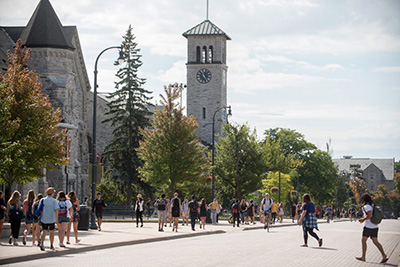
Dr. Fahim Quadir, Dean and Vice-Provost of Graduate Studies and Professor of Global Development Studies, reflects on the crucial role universities have to play in building a more equitable future after COVID-19.
A recent discussion at a meeting with my colleagues in the School of Graduate Studies somewhat unexpectedly provided the context for my deep reflection on the topic of EDII. Are the normative principles of EDII at odds with academic excellence? What is EDII all about? Is this primarily a matter of representation?
I find the current general interest in and support for equity, diversity, inclusivity and Indigenization to be enormously exciting. The debates are intense, engaging, and truly thought-provoking. In most cases, they are no longer about paying lip service to cultivating the civic commons. Nor are they about promoting a political rhetoric without substance. The desire to dig deeper into the underlying causes of racism, colonialism, deprivation, and exploitation is remarkably genuine in much of the academia. Instead of scratching the surface, academic leaders, for instance, are now very much engaged in reimagining the academic mission of universities. The question is not so much one of rearticulating the role of universities as equalizers but rather of redefining the academic mission of post-secondary institutions in the post-COVID world.
Implicit in this profusely important dialogue is a recognition of the fact that we are living in an imperfect world and that universities bear at least some of the responsibility for creating a just, equitable, and sustainable social order. While the commitment to advancing the concept of non-repressive inclusivity varies significantly from one institution to another, the narrative of EDII, especially in Canada, points to an emerging trend that, albeit indirectly, accepts universities’ apparent failure in building a non-elitist framework of teaching, learning, and research. Manifested in the new EDII framework, in other words, is the acknowledgement that universities were and are part of the problem. Despite championing academic freedom and equity, most universities did not do enough to level the playing field. A false dichotomy between academic excellence and inclusivity was in part what prevented most academic leaders from pursuing a comprehensive agenda for creating a global cosmopolis, a common humanity where we belong –one that creates an equal opportunity for everyone to realize their potential. The last few years’ spontaneous social movements, from the “Black Lives Matter” to “Me Too” to the “94 Calls to Action”, however, light the way for a new academic mission for universities. Further, a puzzling conundrum that resulted from the pandemic in effect shed light on the purpose of liberal education. Challenging traditional academic thinking, the pandemic promoted the constructive potential of a collective purpose by exposing us to the divided, unequal world in which we currently live. The unavoidable question that looms in the background of COVID-19 is: what role do universities play in not only restoring a state of normalcy but in fact contributing to building a better normal?
The evolving consensus is that social responsibility will be at the heart of universities’ new academic mission. As a core, foundational value, universities will advance the goals of cosmopolitan humanism and non-repressive inclusivity designed to nurture an environment that brings people together by transcending all traditional divides. EDII in this context becomes a lens, an overarching theme that goes far beyond the typical focus of representation and categorization. It is about making a bold political commitment to creating a just, equitable, inclusive social order where no one is left behind. Nor is anyone denied an opportunity for realizing their constructive potential based on their race, class, gender, age, ethnicity, religion, geography, and physical ability. It proactively expands the boundaries of knowledge production that does not create the aforementioned false dichotomy between academic excellence and inclusivity. Instead of glorifying particular sites and templates of knowledge creation, it cultivates, defends, and legitimizes local praxis. Making a departure from the dominant, more formal, Eurocentric framework of teaching and learning, the EDII framework serves the global good by integrating the local into the global and by fostering a deep sense of belonging to a common humanity.